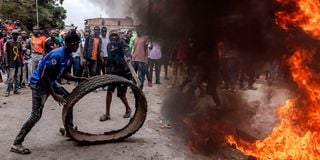Premium
Political class out of touch with reality

An opposition supporter pushes a tire in front of a burning barricade during protests against the high cost of living in Nairobi, Kenya on July 19, 2023.
Dear Editors, it is impossible to tell what may happen between today and tomorrow, so I am seeking a window for corrections should the need arise.
Depending on whom you talk to, the three days of sustained street protests have been either a wild success or abject failure. It is a little too early to say what impact the turbulence has had, but one thing is sure: it cannot be ignored.
Maybe the government is already congratulating itself on a job well done for containing the running street battles. On the other hand, the opposition may claim victory because it made the government aware that it is not as popular as it imagined, and it should no longer take the views of the people for granted.
For a time, it was not clear whether we were in the midst of the dreaded three ‘Rs’: Tax Resistance, generalised Rebellion (insurrection), or the stirrings of a Revolution. It all started with the much-maligned Finance Act 2023, which received presidential assent last month despite spirited opposition from many quarters.
The Act contained a housing development tax, which salaried workers and their employers regarded as oppressive. Efforts by the government to sell it as a way of providing shelter to the poor in some distant future and creating jobs did not convince many due to its obvious illogicalities.
Rather belatedly, Kenyans came to realise that the import of that tax was trivial compared to the negative impact the doubling of value added tax on fuel products would have on their lives.
For all practical purposes, that tax is now a fait accompli, for the government pulled a fast one by imposing it hours before the High Court applied the brakes on the implementation of the whole Act. That matter is right now in abeyance but Kenyans are already paying the fuel tax, and its effects are already being felt by everyone.
This is where Opposition leader Raila Odinga came in. Like all pragmatic politicians, he seized the moment and turned it to his advantage. Only a person living in total denial can claim that he or she has not been affected by the high, and rising, cost of living, unless cushioned by the kind of wealth that is immune to any shock.
People are indeed suffering from the high prices of goods, especially food and other basic necessities in light of the plummeting shilling and high inflation. That is why they are resisting paying higher taxes even when told they have to do it so the country can repay its debts.
Hurting the poor
But in pursuit of their different goals, both the Kenya Kwanza administration and the Azimio leaders seem to have lost touch with reality.
First, Mr Odinga, perhaps from past experience, concluded that only drastic action would make the government recognise that its so-called pro-poor policies were hurting the poor most. But he apparently ignored the fact that mass action without a concrete end in sight often turns into an orgy of rioting and looting that must attract violent reaction from the State.
What was to stop Mr Odinga ordering his supporters not to engage in destructive behaviour? Most would obey him, however sullenly, and the tension would ease.
However, it would appear his advisors would rather misrepresent the ugly situation as a spontaneous uprising against a hopelessly clueless administration, in which case he would, rightly, be accused of cynical opportunism. The danger of unleashing the beast of mass action is that once freed, it may be difficult to control the moment it smells loot in the air. What just happened may be merely the beginning of sustained insurrection.
On the other hand, it is astonishing that the Kenya Kwanza regime should try to use the tactics that worked for it during the elections campaign last year-- painting former President Uhuru Kenyatta as the fiend who is financing the mayhem with the sole aim of dislodging the government.
Rather scanty are the details of how, when and in what form the man could be doing that. It would appear some people believe the association of his name with such nefarious activities would rekindle the animosity that persuaded millions to vote for Kenya Kwanza.
Conveniently forgotten are the real reasons why the “hustler” masses are turning against the 10-month-old administration.
Apparently, the regime believes those who voted for it are too dumb to remember that few of the campaign promises of a better life have been kept, and now it is telling them that to enjoy future prosperity, they must bear the excruciating pain today. There is no doubt about it; the poor are not just unhappy the prices of everything have shot up; they are disgruntled that nobody seems to care.
This is dangerous for the country, for such insurrection may, if not properly contained graduate into something more sinister—a revolution which is a lot more sinister.
My favourite definition of this phenomenon is that it is a revolt against the authorities due to perceived socio-economic oppression and political incompetence. Unless we are careful, we are on the way to ticking all the right boxes. A possible way out is for the government to agree to structured negotiations involving more than 14 belligerent party hawks in a closed room talking at cross-purposes.
- Mr Ngwiri is a consultant editor; [email protected].





